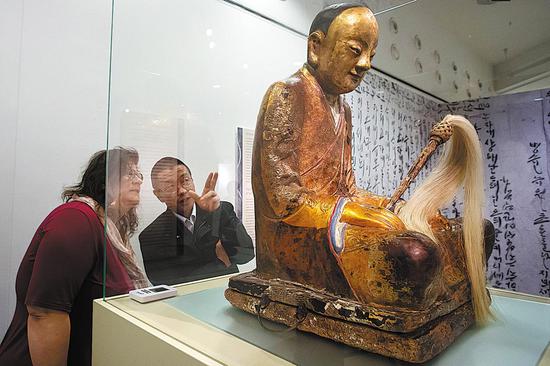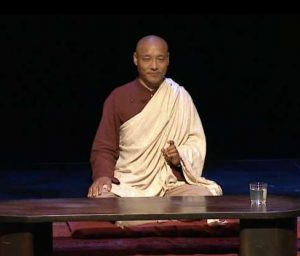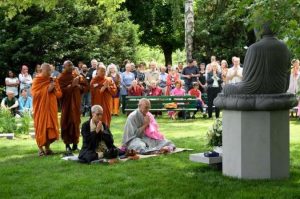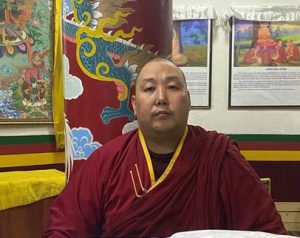
The provincial High People’s Court in Fujian, China, announced on Tuesday that it would uphold a lower court’s order that Dutch art collector Oscar van Overeem return to China a Buddhist statue that he claims to have bought in 1996. The previous ruling, made in 2020, held that residents of the villages of Yangchun and Dongpu in Fujian had a legal right to demand the return of the Zhang Gong Patriarch—a Buddhist statue containing the mummified remains of a famous monk—which had been in a local temple for approximately 1,000 years before it disappeared in December 1995.
The villagers allege that the statue had been kept on display at Puzhao Temple in Sanming, Fujian. Van Overeem claims to have purchased the sculpture legally in Hong Kong in 1996, but has no receipt for the purchase. The statue then disappeared from public view until it resurfaced in 2015, and was recognized in a display at the Mummy World Exhibition in a Budapest museum.
Lin Kaian, a resident of Yangchun who was present in court at the time of the ruling, said: “I’m glad to hear the high court ruled in favor of us demanding the return of the statue. We respect the verdict, and we hope the statue will be back with us as soon as possible.” Lin continued: “If the statue returns, we’ll still enshrine it in the temple and welcome others, including foreigners like Oscar van Overeem, to visit it.” (ECNS)
The villagers originally filed the suit in 2018, after negotiations for the return of the statue broke down. They cited a Dutch law prohibiting the ownership of the body of a known person in order to open a suit in the Netherlands.
Yangchun village spokesman Lin Wen Qing said: “We grew up with the statue. He was there day and night. He is our spiritual leader. For us, it is the most important thing to have him back.” (The Guardian)
A Dutch court earlier dismissed the lawsuit, stating that the the villagers did not have standing to make their claim.
The challenge now will be implementing the Chinese court’s ruling in Europe. Song Jingyi, a civil lawyer from Jingsh Law Firm in Beijing, stated that the Chinese authorities could appeal to the principle of reciprocity in asking Dutch officials to enforce the court’s verdict.
“Implementing the ruling, I think, will take some time and may even be difficult as China and the Netherlands haven’t yet mutually recognized the agreement on judicial adjudication so far,” Song said. “But the recovery of lost cultural relics from overseas through judicial procedures is significant because it opens a legal way of recovering such relics and also shows our country’s determination to protect the relics.” (ECNS)
If successful, the case could open the door for the return of other important cultural relics that have been smuggled out of China and other countries.

China Cultural Relics Academy member Liu Zheng described the villager’s claim as “comprehensive” and “credible.” (Global Times) Liu noted that China had joined the UNIDROIT Convention on Stolen or Illegally Exported Cultural Objects, which aims to prevent the illegal trading of cultural relics by using international laws and regulations to ensure the return of stolen objects.
The monk whose body is encased within the statue is Zhanggong Zushi, originally named Zhang Qisan, a Buddhist monk during China’s Song dynasty (960–1279). The practice of gilding and preserving respected monks—rare throughout Buddhist history—has led to the creation of highly revered religious objects.
Read more
Dutch collector ordered to return Buddha statue (ECNS)
‘Our spiritual leader’: Chinese villagers appeal for return of 1,000-year-old monk (The Guardian)
Chinese court orders Dutch collector to return smuggled 1,000-year-old mummified Buddha statue (Global Times)
Chinese court tells Dutch collector to return Buddha statue (The Seattle Times)
Related news reports from BDG
Archeologists Unearth China’s Earliest Bronze Buddhist Statues To Date
Hong Kong Author Challenges the History of Antique Chinese Buddhist Statues
Mysterious Giant Buddha Statue Discovered in Chongqing, China
British Museum to Return “Stunning” Gandharan Buddhist Artifacts to Afghanistan
Ethics Complaint about Gandharan Manuscripts Leads to Admonishment of Australian Academic
1,500-year-old Head Looted from Buddhist Grottoes in China Returns After 90 Years
Related features from BDG
Buddhistdoor View: Respectful Scholarship – Moving Forward and Learning from the Past












